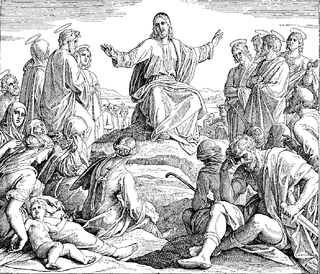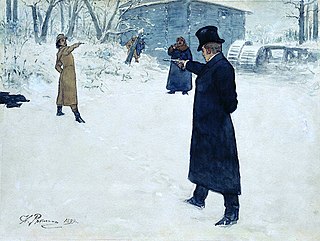
The Golden Rule is the principle of treating others as one wants to be treated. Various expressions of this rule can be found in the tenets of most religions and creed through the ages. It can be considered an ethic of reciprocity in some religions, although different religions treat it differently.

The parable of the Good Samaritan is told by Jesus in the Gospel of Luke. It is about a Jewish traveler who is stripped of clothing, beaten, and left half dead alongside the road. First, a Jewish priest and then a Levite come by, but both avoid the man. Finally, a Samaritan happens upon the traveler. Although Samaritans and Jews despised each other, the Samaritan helps the injured man. Jesus is described as telling the parable in response to a provocative question from a lawyer, "And who is my neighbor?", in the context of the Great Commandment. The conclusion is that the neighbor figure in the parable is the one who shows mercy to their fellow man.
In Christianity, agape is "the highest form of love, charity" and "the love of God for man and of man for God". This is in contrast to philia, brotherly love, or philautia, self-love, as it embraces a deep and profound sacrificial love that transcends and persists regardless of circumstance. The verb form goes as far back as Homer, translated literally as affection, as in "greet with affection" and "show affection for the dead". Other ancient authors have used forms of the word to denote love of a spouse or family, or affection for a particular activity, in contrast to eros.

Matthew 5 is the fifth chapter of the Gospel of Matthew in the New Testament. It contains the first portion of the Sermon on the Mount, the other portions of which are contained in chapters 6 and 7. Portions are similar to the Sermon on the Plain in Luke 6, but much of the material is found only in Matthew. It is one of the most discussed and analyzed chapters of the New Testament. Warren Kissinger reports that among early Christians, no chapter was more often cited by early scholars. The same is true in modern scholarship.

Matthew 5:33 is the thirty-third verse of the fifth chapter of the Gospel of Matthew in the New Testament and is part of the Sermon on the Mount. This verse is the opening of the fourth antithesis, beginning the discussion of oaths.

The Ten Commandments, or the Decalogue, are a set of biblical principles relating to ethics and worship that play a fundamental role in Judaism and Christianity. The text of the Ten Commandments appears twice in the Hebrew Bible: at Exodus 20:2–17 and Deuteronomy 5:6–21.

Matthew 5:40 is the fortieth verse of the fifth chapter of the Gospel of Matthew in the New Testament and is part of the Sermon on the Mount. This is the third verse of the antithesis on the commandment: "Eye for an eye".

Matthew 5:43 is the forty-third verse of the fifth chapter of the Gospel of Matthew in the New Testament and is part of the Sermon on the Mount. This verse is the opening of the final antithesis, that on the commandment to "Love thy neighbour as thyself".

Matthew 5:44, the forty-fourth verse in the fifth chapter of the Gospel of Matthew in the New Testament, also found in Luke 6:27–36, is part of the Sermon on the Mount. This is the second verse of the final antithesis, that on the commandment to "Love thy neighbour as thyself". In the chapter, Jesus refutes the teaching of some that one should "hate [one's] enemies".
The Great Commandment is a name used in the New Testament to describe the first of two commandments cited by Jesus in Matthew 22:35–40, Mark 12:28–34, and in answer to him in Luke 10:27a:
... and one of them, a lawyer, asked him a question to test him. "Teacher, which commandment in the law is the greatest?" He [Jesus] said to him, "'You shall love the Lord your God with all your heart, and with all your soul, and with all your mind.' This is the greatest and first commandment. Love God above all else. And the second is like it: 'You shall love your neighbor as yourself.' On these two commandments hang all the law and the prophets."
Heroic virtue is a phrase coined by Augustine of Hippo to describe the virtue of early Christian martyrs and used by the Catholic Church. The Greek pagan term hero described a person with possibly superhuman abilities and great goodness, and "it connotes a degree of bravery, fame, and distinction which places a man high above his fellows". The term was later applied to other highly virtuous persons who do extraordinary good works.
Religious views on love vary widely between different religions.
The Second Commandment refers to:
Judaism offers a variety of views regarding the love of God, love among human beings, and love for non-human animals. Love is a central value in Jewish ethics and Jewish theology.

"Thou shalt not steal" is one of the Ten Commandments of the Jewish Torah, which are widely understood as moral imperatives by legal scholars, Jewish scholars, Catholic scholars, and Post-Reformation scholars.

"Thou shalt not commit adultery" is found in the Book of Exodus of the Hebrew Bible. It is considered the sixth commandment by Roman Catholic and Lutheran authorities, but the seventh by Jewish and most Protestant authorities. What constitutes adultery is not plainly defined in this passage of the Bible, and has been the subject of debate within Judaism and Christianity. The word fornication means illicit sex, prostitution, idolatry and lawlessness.

Thou shalt not kill, You shall not murder or You shall not kill (KJV), is a moral imperative included as one of the Ten Commandments in the Torah.

"I am the LORD thy God" is the opening phrase of the Ten Commandments, which are widely understood as moral imperatives by ancient legal historians and Jewish and Christian biblical scholars.

Psalm 50, a Psalm of Asaph, is the 50th psalm from the Book of Psalms in the Bible, beginning in English in the King James Version: "The mighty God, even the LORD, hath spoken, and called the earth from the rising of the sun unto the going down thereof." In the slightly different numbering system used in the Greek Septuagint and Latin Vulgate translations of the Bible, this psalm is Psalm 49. The opening words in Latin are Deus deorum, Dominus, locutus est / et vocavit terram a solis ortu usque ad occasum. The psalm is a prophetic imagining of God's judgment on the Israelites.

An enemy or a foe is an individual or a group that is considered as forcefully adverse or threatening. The concept of an enemy has been observed to be "basic for both individuals and communities". The term "enemy" serves the social function of designating a particular entity as a threat, thereby invoking an intense emotional response to that entity. The state of being or having an enemy is enmity, foehood or foeship.









